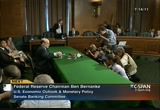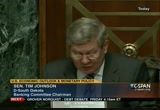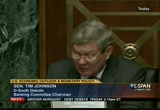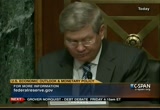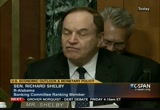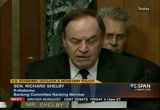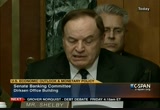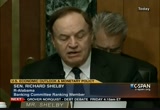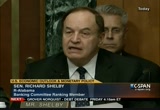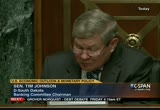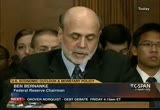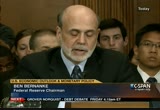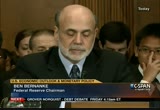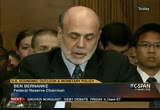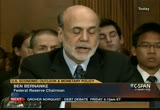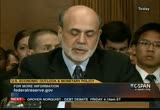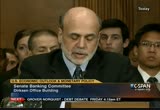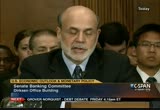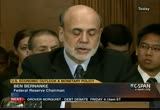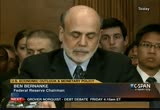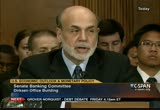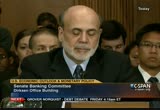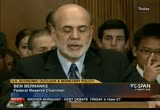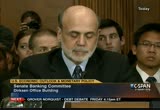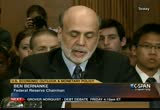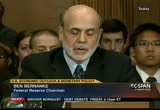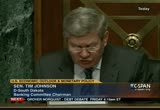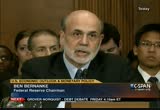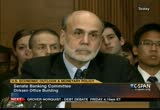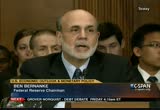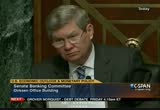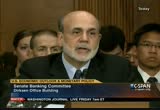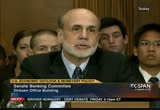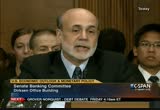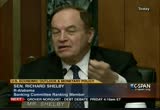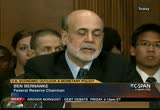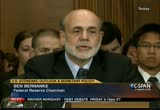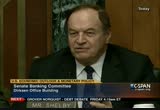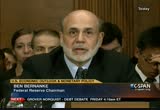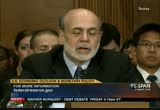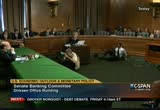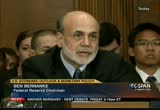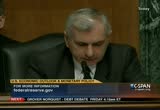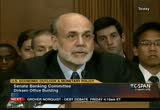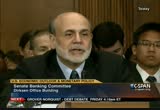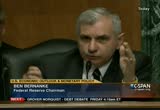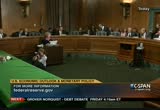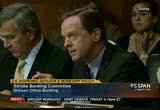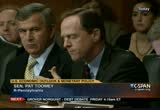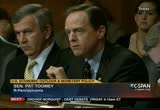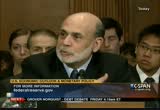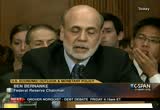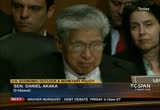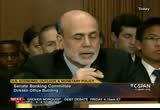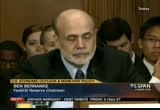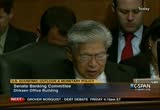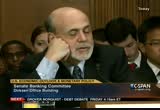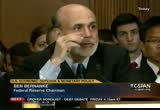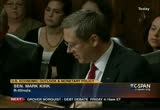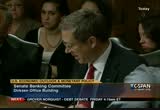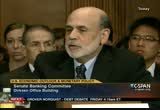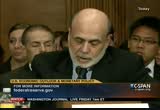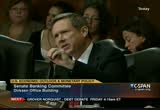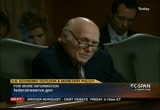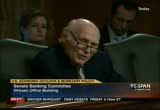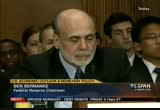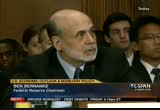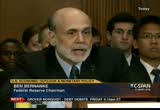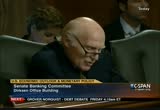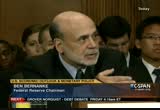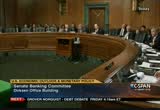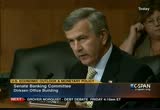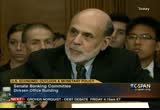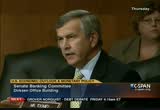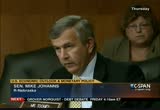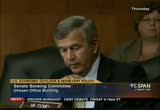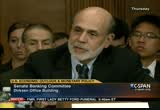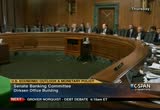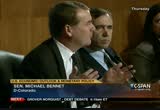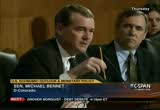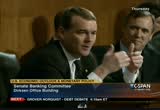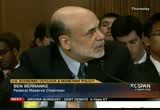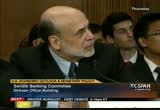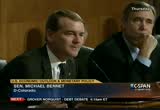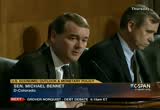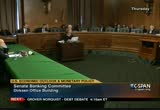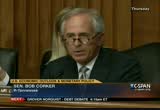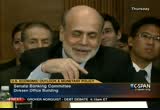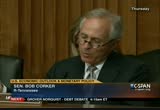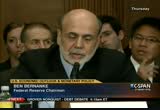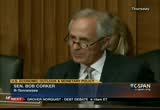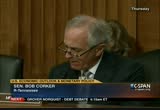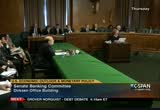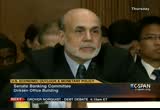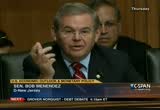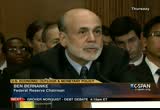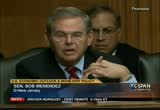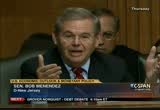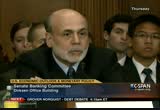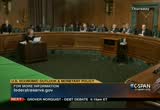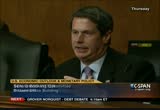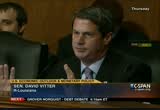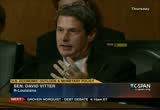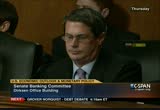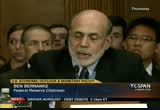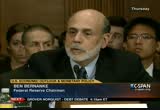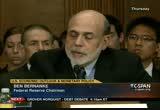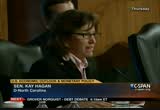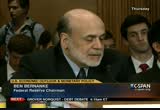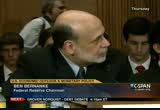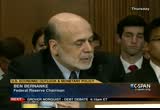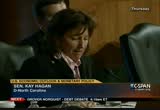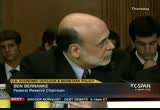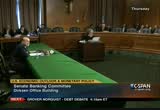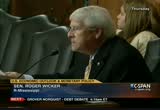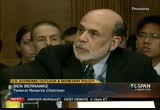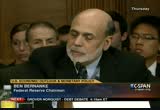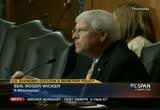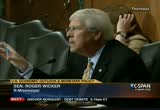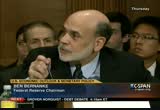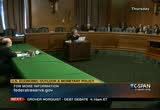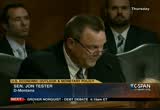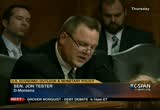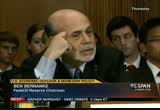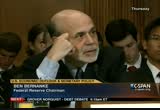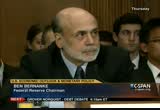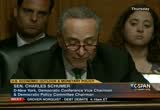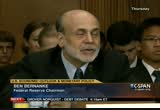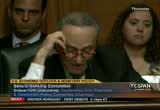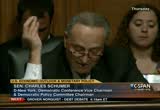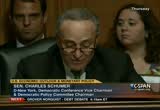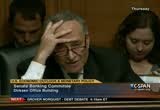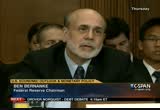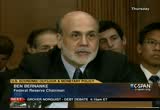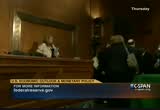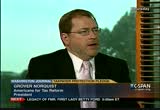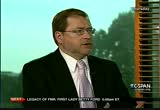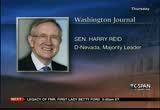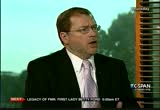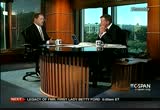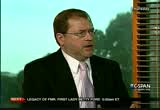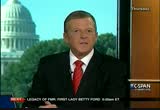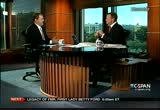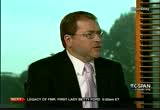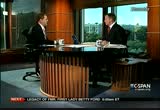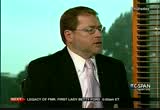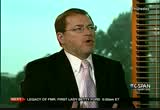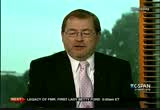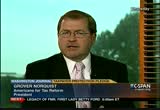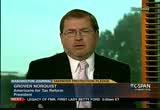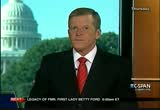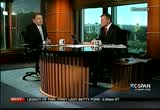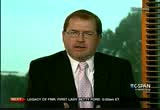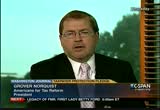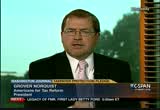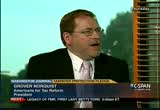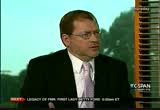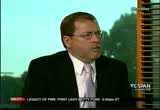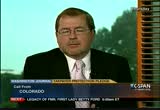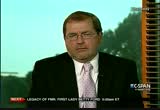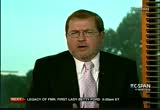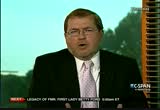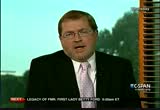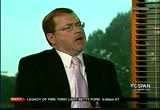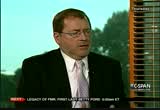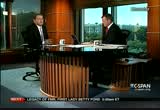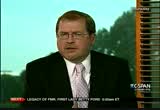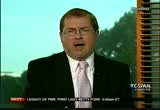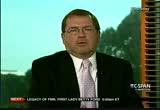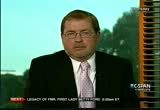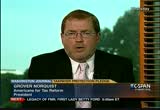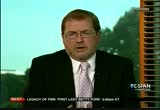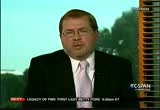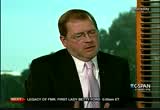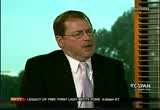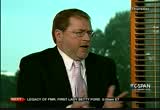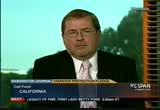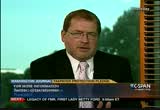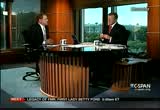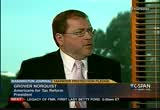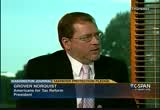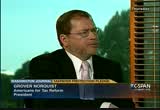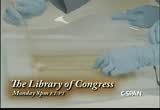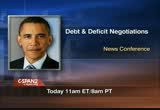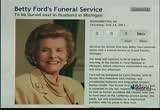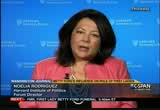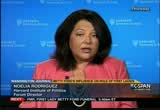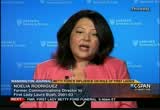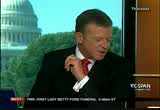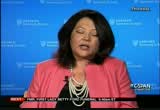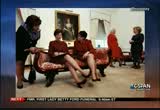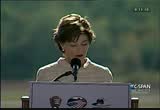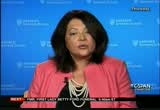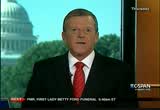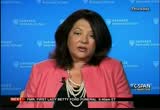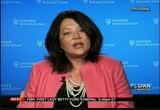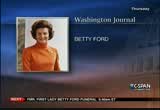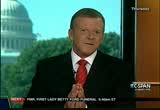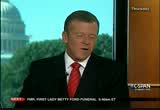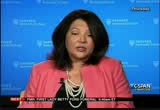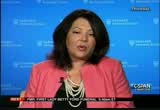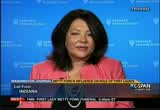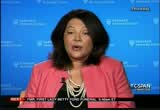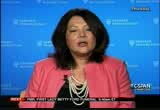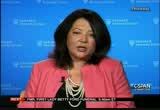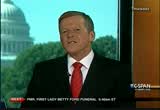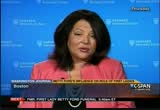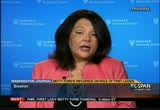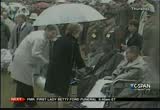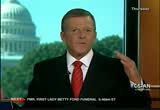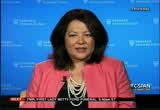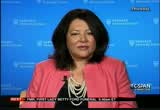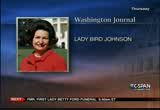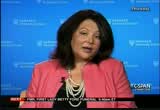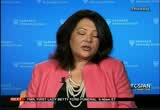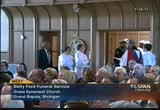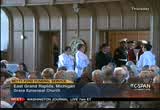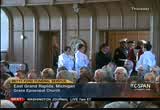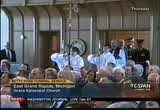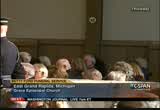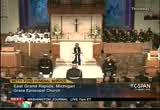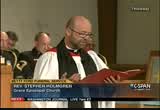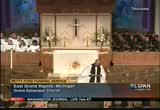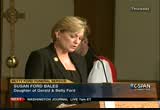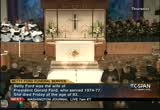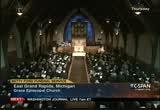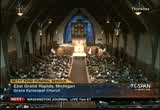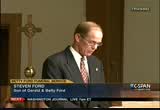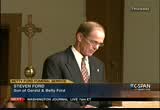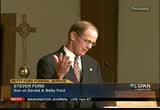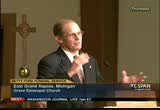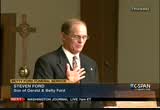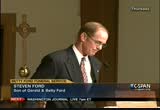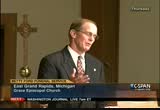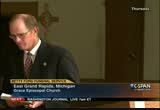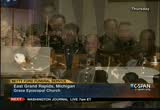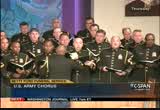tv Today in Washington CSPAN July 15, 2011 2:00am-6:00am EDT
2:00 am
>> federal reserve chairman ben bernanke says failing to raise the debt ceiling would likely mean higher interest rates, slower economic growth, and a larger national debt. he testified before the senate banking committee for a little more than two hours. >> we are pleased to welcome chairman bernanke who will deliver the federal reserve monetary report. his testimony comes at an important time. our economy is recovering from
2:01 am
the disaster created by the financial crisis. the recovery is far from complete. >> employment is unacceptably low. the unemployment rate remains at 9.2%. the high levels of unemployment are matched by output best is significantly lower than it ought to be. cbo estimates of potential gdp shows that the economy is 5.6% below what it could be producing. of course, the housing market, which is an important source of wealth for many families in our economy, has yet to recover from the house price bubble. all the prices or down -- although prices are down significantly -- significantly
2:02 am
from the 2006 peak level, inventories of vacant houses remained high and residential investment is below pre crisis levels. in addition to these economic problems, there are concerns about how the european sovereign debt crisis will evolve and what effect it may have on financial markets and institutions. determining the best policy for such a set of economic circumstances is no easy matter. one thing is certain -- we need to put the financial market safeguards into place as an as reasonably possible. -- as soon as reasonably possible. we must prevent a repetition of the events of 2007 and 2008. chairman bernanke, i look forward to your insights on these issues. opening statements will be limited to the chair and
2:03 am
ranking member. i now turn to the ranking member, senator shelby. >> thank you, mr. chairman. welcome, again, chairman bernanke. last month the open market committee announced the end of the second round of so-called quantitative easing, commonly referred to as qe2. chairman bernanke had claimed that because of qe2, we no longer have the inflation risk. the data seems to support your claim. for example, the 12 but change in the consumer price index reached 3.6% in may. inflation, however, reveals that the most challenging task still lies ahead. the federal reserve's balance sheet presently stands at about
2:04 am
$2.90 trillion while the federal funds rate has been effectively zero for more than 2.5 years. as a result, i believe the stage is set for a resurgence of inflation if the fed is not real careful. the task confronting the fed is out to unwind its massive balance sheet without sparking more inflation or damaging the economy, a real task in itself. unfortunately, the dismal performance of our economy and our record federal deficit will make this exceedingly difficult in the years ahead. chairman bernanke, i believe, must also contend with the consequences of the administration's economic policies. their failure to adopt a pro- growth economic plan or to restrain federal spending has effectively blocked the fed into a corner. if the fed is to curb inflation, it ultimately as to raise interest rates. the absence of economic growth will likely make it more painful for the economy.
2:05 am
if the fed does not raise interest rates, inflation is almost injured. -- higher inflation is almost ensured. federal borrowing costs will soar. that will worsen an already severe crisis. the last thing our economy needs is an inflation scare. the economic history of the '70s should have taught us that it is more painful to get a inflation under control than it is to keep the inflation in check in the first place. history also shows the fed's monetary policy remains too loose for too long. accordingly, our markets are watching to see if chairman bernanke's plan will work. this hearing gives chairman bernanke the opportunity to explain to the american people how the fed intends to navigate to this difficult time. -- through this difficult time.
2:06 am
in chairman bernanke last testimony, i was pleased that he explicitly stated the fed's price stability target is 02%. today, i would like to know more about how you plan to achieve this target. for example, what is the acceptable range around 2% inflation target? it the fed thinks the recent escalation data will show inflation above 3% -- if inflation is above target, how does the fed plan to reduce it? in addition, i would like to know how the ongoing turmoil in the european union could affect monetary policy here. will the euro crisis affect stability? will it constrain the fed's ability to restrain -- affect price stability. the federal open market committee has terminated qe2.
2:07 am
it has said it will maintain the policy of reinvesting principal payments by and existing securities holdings. testimonyernanke's further indicates that the open market committee may consider another round of quantitative in easing. -- quantitative easing if the weak economy continues. as a result, the fed's balance sheet could easily lose way beyond $3 trillion. it appears the fed may be going in the wrong direction. recent federal open market committee meetings indicate that the fed is developing plans for addressing its balance sheet. i hope that chairman bernanke can't shed more light on the options the fed is considering and when the fed will begin this difficult task. finally, i would like to commend chairman bernanke on his recent decision to hold press conferences after the federal open market committee. this is an important step in
2:08 am
recognizing that the fed can no longer make policy behind closed doors. the fed's policies will be more effective if they are understood and supported by the public. this step also recognizes that the fed's history of antiquated practices needs to stop. >> chairman bernanke, before you began your testimony, we want to let you know that i may have to excuse myself during today's hearing. the appropriations subcommittee -- i may need to be on the floor this morning as we began debate on this bill.
2:09 am
senator reid will take over the gavel. chairman bernanke, please begin. >> thank you, mr. chairman, ranking member shelby, and other members of the committee, i am pleased to present a report to the congress. i will start with current economic conditions, the outlook, and return to policy. the u.s. economy is continuing to recover, but the pace of expansion has been modest. after increasing at an annual rate of 2.25%, real gdp growth is at 2% growth in the first half of this year. incoming data suggest that the pace of recovery remains soft. at the same time, the unemployment rate has moved back above 9%. it had appeared to be on a downward trajectory at the first of the year.
2:10 am
in part, the recent weaker than expected economic performance appears to be the result of several actors that are likely to be temporary. notably, the run-up in prices of energy, especially gasoline and food, has reduced consumer purchasing power. the supply chain disruptions that occurred following the earthquake in japan caused u.s. motor vehicle producers to curtail assembly. -- and limited the availability of some models. looking forward, however, the apparent stabilization of oil and other commodities should ease the pressure and a vehicle manufacturers report they are making significant progress in overcoming part shortages and will increase production this summer. in light of these developments, the most recent projections of the federal reserve board and presidents at federal reserve banks reflect their projection that the pace will pick up in the coming quarters. projections that, if realized,
2:11 am
would constitute a better performance than we have seen so far this year. fomc participants continue to see the economy strengthening with a real increase in gdp picking up to 3.5% in 2013. at the same time, the central tennessee for projections of gdp growth for 2011 and 2012 were marked down 0.5%, suggesting that participants saw first part of the slowdown as persistent for a while. among the head when space in the -- among the headwinds facing the economy of the slow growth in consumer spending, even after accounting for the
2:12 am
effects of energy prices, the housing sector, limited access to credit for poor households and small businesses, and fiscal tightening from all levels of governments. consistent with projected growth in real output,fomc participants expect that over time the jobless rate will decline, yet slowly. the central tendencies forecast for the unemployment rate was 8.6% to 8.9% for the first quarter of this year, 7% to 7.5% at the end of 2013. recent data at the test to the -- attests to be continuing weakness of the labour market. the unemployment rate increased to 9.2% in june and gains in non-farm payroll employment were below expectations for consecutive months. but the more than 8.5 million jobs lost in the recession, 1.75 million have been regained.
2:13 am
of those employed, about 6% of workers report that would like to be working full-time, but can only obtain part-time work. nearly half of those unemployed have been out of work for six months, the highest ratio since the post world war ii period. this places hardships on the unemployed and it leads to the erosion of skills. it impairs their lifetime employment prospects and reduces the potential our economy holds. the ability and willingness of consumers to spend will be an important determinant for the pace of recovery in the coming quarters. real disposable personal income was boosted by the reduction in payroll taxes. gains were largely offset by higher prices for gasoline and other commodities. households report they have
2:14 am
little confidence in the recovery and their own income prospects. the ongoing weakness in home values is holding out household wealth and weighing on consumer sentiment brigid household debt -- wayne on consumer sentiment. household debt burdens or declining. credit cards and other loans are down significantly. the number of homeowners having a more just payment for the first time is decreasing. the pickups in job creation with the easing in price pressures should bolster real household income, cacophonous, and spending in the medium run. residential construction activity remains at an extremely low level. demands for homes have been depressed by many of the same factors that have held down spending more generally. mortgage interest rates are near record lows, but access to mortgage credit continues to be constrained. many potential home buyers remain concerned about buying
2:15 am
into a falling market. the weak demand for homes, the substantial backlog for properties are keeping downward pressure on house prices. two bright spots have been exports and business investment in equipment and software create demand for u.s.-made capital goods for domestic and foreign firms has supported domestic production throughout the recovery so far. both equipment and software and outlays andexports increased solidly in the first quarter. orders received that the trend will continue in recent months. corporate profits have been strong. access to capital markets have been able to refinance. conditions for businesses have continued to ease, although the availability of credit has been limited for small firms. inflation has picked up so far
2:16 am
this year. the price index for personal consumption expenditures rose at an annual rate of more than 4% in the first five months of 2011. 2.5% on a 12 month basis. much of the celebration was the result of higher prices for oil and other commodities in for imported goods. prices of motor vehicles increased sharply. -- when supplies of new models were curtailed by parts shortages. most of the recent rise in inflation appears likely to be transitory. inflation is expected to subside in coming quarters and raise at or above 2%. that is consistent with our dual mandate of maximum employment and price stability. the central tendency for the rate of increase for the index was 2.5% for 2011 as a whole. that implies a significant slowing of inflation in the
2:17 am
second half of the year. in 2012 and 2013, the central tendency for the inflation forecast was 1.5% to 2%. reasons to expect inflation to moderate are already showing through retail gasoline and food prices. the substantial slack in u.s. labour and products markets, which is made it debacle for -- which has made it difficult for workers to obtain wage gains, and burns to pass to a higher cost. higher expectations are measured by surveys of households. turning to monetary policy, it is our judgment that the pace of the economic recovery will likely remain moderate. the unemployment rate will decline only gradually. inflation will subside. those are the basis for our decision to maintain a highly accommodative monetary policy. policy currently consist of two parts.
2:18 am
first, the target range for the federal funds rate remains at 0.14%. the committee expects that economic conditions are likely to warrant exceptional levels for an extended time. the second component of monetary policy is to increase the federal reserve's holding of long-term securities. an approach undertaken. the acquisition of longer-term treasury securities cause of longer-term treasury yields to be lower than they would have been otherwise. by removing substantial quantities of longer-term treasury securities to market, the fed's purchases induced private investors. -- to acquire other assets that serve as a substitute for their securities. the fed policy asset purchase program has served to reduce the yields an increase the prices of other assets as well.
2:19 am
the net result of these actions are lower borrowing costs and easier financial conditions throughout the economy. we know from experience that when the economy is operating below its potential, easier financial conditions tend to promote economic growth. a number of recent studies suggest that all else being equal, the second round of asset purchases probably lowered interest rates 30 basis points. -- approximately 10 to 30 basis points. our analysis indicates that a reduction in long-term interest rates would be roughly equivalent in terms of its effect on the economy. in june we completed the planned purchases of longer- term treasury securities that we initiated in november while continuing to reinvest the proceeds. although we are no longer expanding our security
2:20 am
holdings, the evidence suggest the degree of accommodations is determined primarily by the mix of securities that the federal reserve holds rather than by the current pace of new purchases. even with the end of net new purchases, maintaining our holdings of the securities continued to put downward pressure on market interest rates than would otherwise be the case. it is worth emphasizing that our program involves purchase of securities, not government spending. as i will discuss later, we will unwind those purchases. interest on the securities is being remitted to the u.s. treasury. when we began this program, we did not expected to be a panacea for the country but economic -- for the country's economic problems. however, developments with respect to both components of our dual mandate was needed.
2:21 am
in that context, we believe that the program would help reduce the risk of inflation and provide a needed boost to the economy and job creation. the program had the intended attacks of reducing the risk of -- effects of reducing the risk of inflation in shoring up economic activity. in the months following the august announcement of our policy, we grew to more normal levels, suggesting that the perceived risk of deflation has receded markedly. this is a significant achievement. projected inflation it can be quite costly. -- projected inflation can be quite costly. with respect to employment, our expectations are relatively modest. the additional purchases could boost employment by about 700,000 jobs over two years, or
2:22 am
30,000 extra jobs per month. even including the disappointing ratings for may and june, which reflected the temporary factors i discussed earlier, private payroll gains have averaged $175,000 a month for 2011. that compares with average increases of 8000 jobs per month in 2010. the comparison is consistent with our expectations for employment gains. will monitor the labor market closely. once the temporary shop that has -- to every shot that have been holding down economic activity passes, we expect to see stronger economic activity and job creation. given the range of uncertainty about the strength of recovery and prospects for inflation over the medium term, the federal reserve remains prepared to respond. -- should economic developments indicate an adjustment would be
2:23 am
appropriate. on the one and come out the possibility remains that the recent economic weakness may prove more persistent than expected. deflationary risk might re- emerge. we may need more policy support. even with the federal funds rate close to zero, we have a number of ways we could look at these conditions further. one option would be to provide more explicit guidance. initiating more securities purchases or increasing the average maturity of our holdings. we could reduce the rate of interest paid to banks on their reserves, thereby putting further downward pressure on short-term interest rates. our experience with these policies remains relatively limited. employing them would entail -- there is a potential risk in cost. we are required to examine the alternatives for employing additional stimulus. on the other hand,the economy
2:24 am
could a ball in a way that could move towards an accommodative policy. the committee has been giving careful considerations as reported in the meetings of the june meeting, it has reached a broad consensus about the steps it expects to follow when the normalization of policy becomes appropriate. when economic conditions warrant, we will cease the reinvestment of principal payments on securities, thereby allowing the federal reserve balance sheet to begin shrinking. at the same time, the committee will modify the court's guidance in its statement. subsequent steps would include increases in the federal funds rate target. from that point on, changing the level or range of the federal funds rate target would be our primary means of adjusting monetary policy in response to economic development. sometime after the first increase in the federal funds rate charges, the committee
2:25 am
expects to initiate sales of securities from its portfolio. this will be fully communicated to the public in advance. once sales began, it is expected to be gradual and steady, but it could be adjusted up or down in response to material changes in economic conditions. over time, the security portfolio is expected to be reduced to the minimum levels consistent with the sufficient sedimentation of monetary -- the efficient implementation of monetary policy. of course, conditions can change. choosing the time to begin policy alimentation, should that be the next direction -- we will carefully consider both parts of our dual mandate. thank you. i am please do take your questions. >> thank you for your testimony. we would now begin the questioning of our witness. please put five minutes on the clock for each member for their questions.
2:26 am
the fed has pursued policies to stimulate the economy. although the fed continues to hold short-term interest rates near 0, it has ended efforts to reduce longer-term rates through quantitative easing. given the high rate of unemployment and the relatively slow growth, -- why not start a new round of easing? >> our policies are already very highly accommodative. we have a zero interest rate. the stock of assets that we have required, which mr. shelby talked about,the continue to put downward pressure on interest rates in the market. i think the important point to make is that the situation today is somewhat different than it was in august of 2010 when we began to initiate discussion of burger purchases of securities.
2:27 am
-- further purchases of securities. at that time, inflation was dropping. inflation expectations were dropping. it looked like inflation was becoming a risk to the economy. at the same time, over the summer the recovery looks like it was appalling. -- looked like it was stalling. we were down to 80,000 jobs per month. growth was not sufficient to prevent what looked like a significant increase in the unemployment rate. we felt that with both unemployment and inflation going in the same direction, monetary policy accommodation was needed. we took that step. today, the situation is more complex. inflation is higher. inflation expectations are close to our target. we are uncertain about the near-term developments in the economy. we would like to see if the economy will pick up, as we are projecting. we are not prepared at this point to take further action. >> your note that a fiscal tightening at all levels of
2:28 am
government is one of the head winds facing the economic recovery. can you explain whether this means that additional short- term fiscal expansion could help us return to full employment and increase overall confidence in the economy? >> mr. chairman, i think our fiscal planning and policy needs to be integrated in the sense that we look at both the short run and the long run at the same time. the congress and the administration are currently looking to make major changes in our spending. deficit projections over the next decade or so. i think it is important that we bring down our deficit so that we will have a sustainable fiscal policy going forward. i want to emphasize that is very important. at the same time, that is a long-term process. it needs to take place over a number of years. i only suggest that as congress
2:29 am
looks at the timing and composition of changes to the budget, that it does take into account that in the very near term that the recovery is still rather fragile. it could be damaging to the recovery. it is up to congress what further actions to take. i could suggest that there are intermediate steps between fiscal stimulus and cuts. that would be, for example, some focus programs on some areas of the economy that are particularly stressed, like unemployment or housing. >> as you acknowledge in your testimony, the economy is stubbornly depressed. residential investment is more than a third below its 1997 levels. inventory of homes that are for sale remain elevated. do you see policy solutions that would help resolve the
2:30 am
problems in the housing market? >> mr. chairman, you are absolutely right that the weakness in the housing market is one of the major sources of the slow recovery. normally in an expansion you see the housing market strengthening, adding jobs, and creating new opportunities. we are not seeing that, in part, because of the big overhang of foreclosed homes, which are weighing on prices. it is a vicious circle. people do not want to buy because prices are falling and prices are falling because people do not want to buy. there are a number of things we are doing. we are keeping mortgage rates globe. -- keeping mortgage rates low. this works to try to modify mortgages. i think it is worth looking at that area. one area where more work needs to be done is housing finance. we have not begun to clarify
2:31 am
for the market out housing finance will be conducted in the future. another area i suggest he might think about is the overhang of distressed houses. for example, fanny, freddie, and the bank's own about half a million homes right now, which are basically sitting there on the market and which are pressing down prices and reducing appraisals and making the housing market much weaker than it otherwise would be. that is another area to look at. i agree with you that the housing market is, in some sense, the epicenter of the problem we're having at the moment. >> if there is no agreement on raising the federal debt limit, what would be the effects on financial markets and the economy if we were to default on our obligations?
2:32 am
>> i think it would be a calamitous outcome. it would create a very severe financial shock that would have effects on the u.s. economy and the global economy. treasury securities are critical to the entire financial system. they are used in many different ways. for example, as collateral. default on those securities would for the financial system potentially into chaos. in any case, what will certainly be the case is it would destroy the trust and confidence investors have in u.s. securities been the safest assets in the world. we are ready seen threats of downgrades from ratings agencies. this is a tremendous asset to the united states -- the quality and reputation of our securities.
2:33 am
i would urge congress to take every step possible to avoid defaulting on the debt or creating any significant probability of defaulting on the debt. >> senator shelby. >> mr. chairman, i tell us -- of course, you were speaking to the american people? why our economy is not moving? our jobs are not growing. unemployment is going in the wrong direction. 9.2% official unemployment right now. that is according to the labor department. it is about 16%. that is very, very high. it does not bode well for the future of all of us. why is all of this? is it just the housing bubble?
2:34 am
is it reckless lending that put a lot of our banks in jeopardy? tell us what it is and how do we get out of it. is it reckless spending? >> senator, you almost answered your question. >> not as well as you could. >> first, let me say as i mentioned in my testimony, we do think the weakness in the first half of this year is, in part, due to temporary factors. we talked about the disaster in japan and the developments in the middle east and so on. we think we will see somewhat better growth going forward. with that being said, it has been a very slow recovery. there are a number of reasons for that. one is the aftermath of the housing bubble. so many houses empty and prices having fallen so much.
2:35 am
that has created almost no new construction in housing. people have lost wealth because they no longer have any equity in their homes. the second is that we know from a lot of research that companies after financial crisis can be slow because it takes time for the system to become operative again. i think there is some improvement in the banking system. there are some areas that are constrained to some extent, such as business lending. the consumer has been very cautious, trying to build a backup for their wealth, concerned about the durability of the recovery, where about their financial prospects. even though the high price of gasoline and food has taken away purchasing power, even beyond that, as i mentioned, confidence is pretty low and consumers are not showing the confidence in terms of spending. i didn't mention that there is, in the near term with all the
2:36 am
fiscal stimulus and tightening -- for example, the job numbers of last friday, the private numbers were better than the headline numbers because part of the report was a loss of 40,000 state and local jobs as governments are being forced to contract. over time, it is possible that we will change the composition of public and private employment. in the short run, as jobs are lost elsewhere, it creates pressure on the economy. >> are you basically telling us we are not going to have a robust recovery, not in the next six months, eight months, or 10 months? >> we are expecting improvement, but not something like what normally follows a recession. >> let's talk about the european crisis for a minute. we are all familiar with this to some extent.
2:37 am
greece, portugal, ireland -- it seems to me that they are sitting on a financial time bomb. do you believe the european union will stay together? can it stay together with some smaller countries and fragile economies that will basically never paid their debt back? what will happen? how will it impact us? >> first, the european leadership places great value on maintaining the euro area and maintaining the integration that has taken place. they are making extraordinary efforts to address these problems. the problems are not entirely economic. the three countries you mentioned are a small part of the european continent and the european economy. the questions are at least as
2:38 am
much political. they involve how we address the problems in these countries. one approach is to try to do it completely through austerity, to cut and cut and see if they can make get with a little bit of temporary assistance. another strategy would be to get more direct assistance from other countries, but that is a very unpopular strategy in some of the countries that would be expected to pay. >> but that is not a solution to the problem. >> if the better-off countries were solving the problems of the small countries, it would take care of the issue. they would make sure the country's staley healthier path in the future. there are different ways to approach this. it descend -- a political issue as much as an economic issue. it is causing, as you know,
2:39 am
anxiety in the markets. that has been affecting our economy last summer and recently as well. we are spending a lot of time evaluating the exposures of u.s. financial institutions to these countries, including money-market mutual funds and so on. the direct exposure to the three countries you mentioned are quite small and manageable. we would not expect direct impacts to be the critical channel at their work problems, default for example. i think, nevertheless, the u.s. economy is at risk from those developments. were there to be a significant deterioration in conditions in europe, we would see a general increase in risk-aversion, asset prices, volatility in markets. we would suffer from that more general situation than we would
2:40 am
draw the direct exposure to the sovereign countries. >> senator reid. >> thank you very much, mr. chairman. following up on center johnson was a question about default on our outstanding obligations, some have suggested that if we cannot resolve the debt ceiling limit, we simply prioritize payments. we pay principles and interests. that, of course, requires us to not pay anything but a military pay and social security. in the context of the financial sector, with that fix the problem? not having the debt when it extending but trying to play as long as we get on our securities? >> first of all, it is the treasury's area to determine how they are going to manage this. they had been clear that they do not think it is appropriate or
2:41 am
feasible to prioritize. as the fiscal agent, the federal reserve simply does what they tell us to do. there are, in fact, some operational issues that arise if we try to do it. again, the treasury is the determinant of this. they are pretty clear that they do not think that is a solution. that being said, whether default is on securities or on payments we go to medicare recipients, it is going to constitute a default of some type on obligations incurred by the u.s. government. it will certainly have an impact on the economy and confidence. what inference should investors to take from the fact that the u.s. is not paying its bills and it cannot resolve these issues? there is not really any solution to solve these problems
2:42 am
or address the fiscal issues. >> let me explore a little bit. moody's, today, and standard and poor's has suggested that they are putting us on the watch, downgrading us if we do not pass the debt ceiling. but the downgrade as. not only u.s. treasuries, but moody indicated fannie mae paper, freddie mac paper. they will also possibly downgrade securities backed by direct links of the united states government. they are going to downgrade things we do not even dead yet. maybe you know. what is this do in terms of interest rates across the board? might we raise them? >> the combination of downgrades
2:43 am
-- we are seeing it, by the way. we are still weeks away to the deadline. loss of investor confidence could potentially raise interest rates quite significantly. the ironic aspect of that is that if we raise interest rates, that means your interest cost go up substantially and you are regressing rather than progressing. >> raising the debt ceiling would be the most likely increase in the deficit we would likely to see. >> it would be a self-inflicted wound, i would say. >> let me ask about something else. you talked about predictable crisis, but also a job crisis. what is your presumption of the scenario about jobs? are we likely to see people going out and hiring? >> we have a recent example.
2:44 am
in 2008, the financial system froze up. result in immediate very sharp reduction in the global economy. even if things do not get that bad, it is very hard to predict exactly what is going to happen, but if interest rates rise uncertainty will rise. it will reduce the ability of firms to hire. the government will reduce its payments by 40%. that will have an impact as well. i can only conclude that this will be very bad for jobs. >> let me ask you another area. we discussed -- discovered an explicit problem. that is the situation of derivatives. i would presume that there are a lot of credit defaults swaps and that if they are downgraded,
2:45 am
that could require additional collateral do you have any idea with the aestheticians that you regulate, the potential exposure they would have? >> there are many effects of default ranging throughout the entire system. cds directly on treasurys, as opposed to other securities, are actually not that big. it would take an action of the isda to invoke a credit event. it could be a problem for some institutions, but it would be the biggest problem among other things we have been discussing. >> i want to reiterate that this could be a self-inflicted wound doing more damage than has been done to date. >> it is really not an option we
2:46 am
want to consider. >> thank you. >> thank you, mr. chairman. i want to follow on this for a moment but then i'd want to move on to some other issues. the market proceeds and consequences are starkly different between, on the one hand, the u.s. government failing to make an interest payment on a bond, or on the other hand, delaying the reimbursement to a vendor for failing to cut the grass at the monuments. these are very different events. the month of august, i have scheduled about $30 billion in interest payments. the treasury is sitting on a night for dollar billion portfolio of mortgage-backed securities. we expect a minimum of one of the $25 billion in tax revenue. i do not know anybody who suggests we should go into the league without raising the debt ceiling. we would be much better off
2:47 am
reaching an agreement and raising the debt ceiling before august 2. there is a big difference between paying our debt and other disruptions. this administration just sent a message to the market that under no circumstances will they tolerate a default on their debt that is entirely under their control to prevent. that is not your responsibility, but i would like to address what is under your realm. i have said, mr. chairman, i fully acknowledge the things you have done under very difficult circumstances all had the best motives asian -- motivation. i am concerned about the central bank that we have. the unusual steps we have taken, the enormous discretion the fed now has. my concern is that this potentially distorts markets and also introduces enormous uncertainty and to help the fed will pay. the fed because the biggest player in driving the bond and
2:48 am
equity markets. this is a dangerous place that we have come to. i hope that we revert as soon as possible to more normal role that the fed is playing. one of the unintended, i suspect, if unforeseen consequences of this unusual policy, seems to me, we take the very low in interest rates the fed has maintained for an extended time. it seems to me that this contributes to enabling congress to run excessive deficits. especially when combined did -- compounded by the fact that the fed has -- we are not yet paying the real market price we will eventually have to pay for these massive deficits and this huge debt. i do not think for a minute that is your intention to facilitate
2:49 am
this irresponsibility, but i think it is the unintended consequence of these extremely low interest rates. to your testimony, you have raised the possibility now that if economic circumstances warranted, he would consider opening the door to an additional round of securities purchases. it will no doubt be dubbed qe3. my concern is what is wrong with this economy is not monetary policy. it does other things. i would ask you to comment on what you see is wrong with our economy that qe3 would fix. what is the theory that another round of security purchases will, somehow, generate the economic growth that we lack? >> first, to go back to the facilitation issue -- our goal is to try to meet our mandate
2:50 am
price stability. i do not think that our policy would prevent the loss of confidence if creditors lost confidence in the treasury. it has not happened yet. i do not think it is because of us, it is because they have kopit's in our government budget ability to make its payments. -- they have confidence in our government's ability to make its payments. i recognize the asset purchases are unconditional, but they worked, more or less, the same way as ordinary monetary policy works by lowering an interest rates and providing stimulus to the mechanism. you may be entirely correct that it might not be used and that it might not be particularly get -- particularly effective given the problems that we have. for example, credit not being extended, or if the problems arise from the public sector,
2:51 am
they are not responsive to adjust rates. those are things to take into account. we are not proposing anything today. the main message i want to leave is that this is a serious situation. it involves significant loss of human and economic potential. the federal reserve as a mandate and we want to meet that mandate. to do that, we want to make sure that we have the option when it becomes necessary, but at this point, we are not proposing to undertake that option. >> thank you, mr. chairman. >> thank you very much, chairman. good morning, chairman bernanke. we appreciate you joining us today again. before i begin, i want to thank you very much for your strong leadership. you continue to do an excellent job under very difficult
2:52 am
circumstances. german bernanke, we all understand -- chairman bernanke, we all understand the components of default. many americans do not share this urgency. the gallup poll in may fell to only 19% of americans would want their member of congress to vote for a debt ceiling increase. 34% did not even know enough about the issue to answer the question. another poll in july by pugh and the washington post shows that americans are more concerned about controlling spending than they are about a government default. chairman bernanke, would you please explain specifically how
2:53 am
a government default would affect the everyday lives of working-class americans? >> yes, senator. i would be glad to. the analogy i made yesterday is that this is about sitting down at the kitchen table and making sure your income and spending is equal. that is true for the long run, but the debt ceiling is about paying for bills we have already incurred. putting that aside, not increasing the debt ceiling and allowing default on the debt would have a very real consequences for average americans. first, interest rates would jump. treasury rates are the benchmark interest rate, so interest -- so
2:54 am
mortgage rates would rise. of course, that would also increase the federal deficit because we pay the interest on the debt as part of our spending. if the treasury cut back, as it would be required to do, it would mean that there would be a significant reduction in both payments, benefits, payments for services, aid to the armed forces, and so on. people would see that in terms of their medicare check or whatever benefits they are getting. without much delay, i'd think this would also slow the economy. the job situation would get worse. almost every area where people have concerns -- jobs, interest rates, credit, availability of government benefits -- all those things would be affected.
2:55 am
>> thank you for briefly explaining all that. chairman bernanke, even though home prices have only slightly declined, high-cost housing areas like hawaii are still feeling the effects of the weak housing market. mortgage credit is still limited. concern for the future is that they are performing worse than those sold to or backed by the government. the you think it is a good idea to allow the loan limits to decrease? how might lower limits but that the housing market and home
2:56 am
ownership opportunity? >> the trade-off is -- the increase in legal limits were made on an emergency basis to adjust the housing crisis. the administration is making the determination that it is time to begin to wane a little bit the mortgage market from the prior performing limits. i think the question in terms of the affect on the housing market is what extent our nonconforming jumbo mortgage -- mortgages are available and how they are priced in hawaii. nationally, there has been some improvement in the willingness of banks to make jumbo loans. the differential, which at one point was 100 basis points -- that is closer to 25 or 30 basis points -- that will impose some
2:57 am
extra cost on borrowers of very large mortgages. but i do not think there will be squeezed out of the market in those cases. there are some trade-offs that congress is looking at. >> gracias, mr. chairman. >> thank you, mr. chairman. first, my understanding is according to the august 1989 "financial review close-" we had a technical default in the united states in 1979 with the united states could not pay individual bondholders. my understanding is about a 60. -- 60 basis point rise. you talked about what we defaulted last time.
2:58 am
secondly, i understand that italy just tried to borrow money twice today. their five year benchmark had a 21% increase in the cost of borrowing over last year. it just went up 4.9%, up from 3.9% a year ago. they set a record on that 15- year borrowing. they pay the highest interest rate ever at 5.9%. we are seeing a real m1 decline in italy. should we have the kind of greek-style bailout for spain and italy? it is estimated the imf is $50 billion short. lastly, i am worried about the long-term finances of, especially my home state of illinois and california. given their pension liabilities, ill. being the
2:59 am
lowest paid pensions in the united states, do you see a systemic risk to lose by these two states to the municipal finance and bond sector? >> thank you. it is true that in 1979 that, mostly because of mechanical problems, there were a few treasury bills not received. interest rates did go up, but it is not entirely clear whether it was entirely due to default were due to some other factors such as changes in monetary policy. i do not think it is comparable to the current situation. these were isolated issues. the wall street journal said people did not generally note this had happened. it was not viewed as something that was a broad-based risk to the financial markets. on italy, it is true there have
3:00 am
been market jitters there. the concern you worry about is exactly this kind of vicious circle we worry about in the united states where loss of interest rates makes it even more difficult to get fiscal stability. my sense of italy is that the first line of defense is for italy to take necessary steps. italy has a very high ratio, but it has some strengths.
4:14 am
4:15 am
guest: i asked michelle bachmann to speak. we had a disssion certainly people from boehner's office and mcconnell's office came by to talk about the various proposals back and forth. people don't want tax increases, they do want spending restrain. negotiations are a little built of a black box. host: what do you think of mcconnell's proposal? guest: it's an interesng thing that brings us back to something people don't understand. the government has passed the
4:16 am
budget. that's the one that says on taxes, they will take the top rate to 25%. at the spending level, it takes $6 trillion of additional spending. takes $6 trillion off the table and puts us on a path of a government that's smaller as a percentage of the economy. obama to date has taken us to historical levels up to 25. the democrats have gone two and three years without passing a budget. democrats didn't do a budget
4:17 am
this year or last year. what mitch mcconnell has asked is for the president to actually put in writing what his speeches have been about. really? write them down, show us. and tax increases will be by nobody and they'll be painless. >> really? some of us may think that those taxes would actually hurt the economy forcing the president to come up with a budget, wch he hasn't done they want to run for office based on speeches, the way obama did in 2008. they don't want to run based on
4:18 am
what they plan to spend for the future. mitch mcconnell says you don't get out of this room without writing whatou plan to do. what you are talking about instead of just giving speeches obama has spept the last two years running for president instead of being president these speeches are cute and funny. when you are president of the united states, you really ought to do something. i'm a fan of his approach as one piece of the puzzle. what do we want to have happen? have a dollar of debt ceiling increase, mr. president. then we can have a deal and not
4:19 am
raise taxes. it's been clear six months now so the president can wri his n budget. host: does the debt ceiling feed to be raised? is it possible that they could reign in spendg and not do it? if you start it a couple years ago. the president has increased spending $1 trillion a year. each and every year if the president hpt wasted $800 trillion, we wouldn't have to do this. we are hitting the debt ceiling. in the last of the previous years, they added a trillion to the discretionary spending.
4:20 am
they added a trillion. trying to bring some of that down is important. maybe in acceptinghe cost down teorarily raise the debt ceiling? that's likely. the president doesn't understand. we have nine plus percent of the american people unemployed because he's damaged the economy so much with spending. germany is spending less chinese are spending less. when the government spends money, it doesn't make us richer, it makes us poorer. host: between democrats, republicans, you can always tweet
4:21 am
4:22 am
support is simple. don't sn anypledges. if you go to the website we have the copy of the pledge we ask all to sign it is not americans for tax reform. it very simply we wept through this a week ago they are some what confused. this is a pledge to the voters, not to me. it says, i promise we won't raise taxes. the constitution is a collective dockment. we are saying, you cannot tell us which church to go to.
4:23 am
you promised not to steal anyone's guns. you promised not to use the government what to read or what religion to have or what to say in the public square. previous guys have spent a lot of money. my job is not going to be to steal enough of your moneyo pay for their mistakes we are not going to come and blame oba for your overspending.
4:24 am
we are not going to come pick your pocket because he has no self contl. there are other pledges. i think there is value to a questionnaire where you say here is my possession. national rifle association. where are you on obama's efforts. he spends 9 a.m. to noon getting tax money and spends the rest of the afternoon trying to steal guns. fz hard at work messing with
4:25 am
4:26 am
they get that. those are private promises >> our guest. james a republican from lakeland, florida. first up. good morning. caller: hi, james. i voted republican every insurance icen however and bush one. bush two the first time. when he ran up the deficit and putting in a prescription care plan they didn't pay for and fought two wars that weren't paid for where were we on that? the republican party then, they voted to raise the debt ceiling the same time.
4:27 am
guest: glad to have the guy calling in on the republican libel using democratic party talking points. that's one of the reason the tea party movement is an important corrective for the modern republican party, post reagan. when gold water came in and began to make it the pncipal conservative party. all you knew was that they were born north of the mason dikson side. beginning the process of turning the modern party into a limited constitutional party that wanted to have lower taxes on you less regulations of how to run your
4:28 am
life. spending continued to drift up. the government is always to spend more money. going back to the last $4,000 years of history, governments tend to do so because they have the swoerds and spears and guns to take everybody's money and do just that. you had independents. that's why you see i different party. i agree that bush spent too much he increased spending.
4:29 am
president obama increased total spending each year in two years should we be unhappy that bush in eight years increased the spending? yes. should we notice obama did it in a more permanent way. it is not fair to bush. still, the modern republican party would never tolerate the size and amount and approach that the bush years took towards spending. that's not what woe want to go back to. we want to go forward to less spending than obama and bush.
4:30 am
next call, georgia, you are on the line. >> i do have two quick comments. i wanted to know whoo you think you you are where you are basically holding our elected officials hostage as to sign a pledge going against the american people i don't remember being elected to any official seat where you can do that. i was wandering why anybody should really be listening to you or why you should be on tv. you should be in jail for what you did for the indians on the reservations on. host: do you think gver norquist has heard those comments before? caer: i think he has fm many people. what i fear in this country.
4:31 am
i feel what the american people are experiencing right now is a 1% of the country. my fear is that the republicans are privatizing things in the country now. it means that the public did not have the ability to see who is running these entities and how they are getting paid people are paid, it is usually elected positions. we can go in there, see the books. don't like the job they are doing, we cannot elect them again. host: we have who do you think you are, privatization. guest: susan, you may not have been listening to the previous
4:32 am
few minutes of the show when you said i ask officials to take a pledge to me. i'll say it again slowly. a pledge elected officials sign saying i commit that i will not raise the taxes. it is a commitment to the people of their state it is not a pledge to me. whether you are not hearing it correctly or you you are making it up to try to make a political point, it's kind of silly here's what we are going to did, if you send me to washington, step one. i'm not going to raise your taxes. obamaants the republicans in
4:33 am
office, they ran for office making a commentment. you may want taxes raise but you lost in the last election. your team was smacked hard. not just on rich people but all the american people. the first tax president obama signed, passed a tax increase on cigarette smokers. e only american in the united states that earns more than $250,000 and smokes cigarettes is named barack obama. they want to raise taxes and get more money and spend it. republicans are not go to be allow them to raise taxes. the pledge allows them to do
4:34 am
that. look at the candidate who takes the pledge and says i won't vote for you. you are free to do that. millions do choose just that subject. that's an interesting one. i'm sorry you think i shouldn't be allowed to speak in public. you don't get to make those decisions. when the left gets frustrated and they want to shut down like fox tv, it is a sign of the weakness of their arguments. i welcome people like you speaking out. it helps to elect people on my team. host: jack abramoff.
4:35 am
guest: i am sorry for all the challenges he's had. that was unfornate for him and his family. thankfully he didn't involve me in that. host: do you want to see more privatization? guest: it depends on what you mean. i'm not sure what susan is talking about. in the last few years, the administration nationalized all stu department loans. they are trying to pass regulation which would destroy for profit colges such as university of phoenix and other for profit schools that tend to serve low income people trying
4:36 am
to get job specific education the kind of thing that can get you an actual job that lower income americans tend to do. the obama policy wants to nationalize or put into the state control higher education. one of the fst things he did was to try to destroy -- we had to destroy. they reversed the school choice. their parents could take them to a private school with a fraction of the $13,000 or $14,000 a year that d.c. pays. obama wanted to destroy that idea. it got a little embarrassi.
4:37 am
he looked at them and said i work for the teacher unions, not you. go to heck then he was forced to give lower income students in d.c. that opportunity. we've had obama looking to take away alternatives to government control particularly for poorest kids in school. the good news is obama can only destroy hopes for people in d.c. he can't do it in indiana, pennsylvania and wisconsin at the state level. they are giving the poorest kids in tir states more school choice. both undergrad and mba from harvard university. going to the independent line.
4:38 am
caller: my question is around taxes and the calculation. i need to understand th. i'm an independent. i worked on the reagan campaign. i voted for obama. i will again. i believe the republicans are completely boxed in by the pledge they took. you know my politics. my question is specifically, the republican argument says do not raise taxes on revenue side. if we do that, we'll crush the jobs we are saying democrats will raise taxes for that
4:39 am
4:40 am
4:41 am
4:42 am
they pretend they are taxing companies whenhey are taxing consumers. if you want to remember that whchlt obama took office, he said he was going to spend $800 billion of other people's money. since he said that, we lost 1.4 million. 9% of the country is unemployed. since obama left office, his polici have made americans poor poorer we have to stop the job killing. that's what the fights are about. they have said enough. ronald tweets into you how many
4:43 am
4:44 am
adjusting for inflation, spending went up, not down after that spending deal. he put together americans for tax reform. i am very happy with where reagan was going. there are times he made the mistake in 1982 of getting cheated. host: paul from tennessee. caller: i'm going to try to get you tongue tied. i want to get this out.
4:45 am
i am a republican. i think abortion is murder and gay is an a bomb ination. i am sick of all these parties. when this crook here took office. he said he was going to stop these wars. get down these gas prices and do all thisstuff. he's done nothing but put us in the home. i'm sick of the republican party too. they can't agree what's for us. they have this one pl arized part of the party. guest: i'm not here to defend the republican party. where do you see them failing?
4:46 am
are you for tax increases or against them i keep an eye on them. they keep saying no. where then have they disappointed you? host: he is now gone. if your concern is taxes. this is so disappointing. we think we elected a guy that's one of the reasons why a taxpayer protection pledge. they like politicians that come in promising not to pay taxes. they come in and go to cocktail
4:47 am
parties. everybody is a spending interest lobbiest. overtime, they are supposed to become reasonable and grow in office. the pledge tells people not to grow. it helps they to keep their roots in their town and home state. the good news is because of the pledge and as a tool. it made it easier for officials wh wanted to keephe word when they got elected, to keep it. of all the spending interest, i like you. you have such great points. that's one reason the establishment left is so grumpy.
4:48 am
4:49 am
our unemployment did not go up until the republicans came in and then the governor started laying everybody off guest: ma'am, you are not allowed to make up facts. we can have a conversation about your feelings but you are not allowed to make up numbers. host: indiana. guest: what about the oil p accounts. you made that question and the other person started explaining was talking about revenues and
4:50 am
4:51 am
american people want. when you take the position, what you are really saying is why don't we treat consumers like they are idiots instead of taking money from them, which they'll notice, we'll tax carrots. you don't recognize when you tax things, you are taxing people. when you tax businesses, you are in fact taxing consumers
4:52 am
4:53 am
4:54 am
4:55 am
taxes. he said i'd never raise taxes but i won't agree. at the end of the day, senator coburn promised he would not vote to raise their taxes. it was an unfortunate incident he believed he could raise taxes and me it work. host: republican from riverside, california. caller: i don't know if you consider part of the religious rig
4:56 am
right. you know it says if we take the mark of the beast, we won't be able to go to he haven. i admonish everyone to keep their priorities straight. guest: people who raise taxes may be able to get into heaven, i just don't think they should be in office. get republica to calm in o the republican line. i've had three democrats calling in on the republican line. participate guys. get on the phone. use the republican line, not the democratic line. the other team does that don't you do that. call in and ask questions.
4:57 am
4:58 am
4:59 am
5:00 am
for esident. you do that once, younow better next time. i would add chris christi, the president republican governor they reformensions so over the next 30 years, people in new jersey will spend $130 billion lesson the pension system. that means the government services people pay for is $130 billion over 30 years. that's real money in real time. a lot of people today would be alive in 30 years and save that property tax. he has theame i.d. they know who he is. they've heardf his successes.
5:01 am
5:02 am
jefferson library. and we'll learn how the library is using technology to preserve items. join us at 8:00 p.m. specific on c-span. the library hold it is personal records of over 900 current and former members of congress. >> in a few moments, a discussion of the legacy of the late first lady, betty ford. followed by her funeral. "washington journal" begins at 7:00 a.m. and the house is in session at 10:00 a.m. to continue considering the water bill. several live events to tell you about this morning, the house
5:03 am
energy and commerce subcommittee is looking into pipeline safety. that's on c-span 3. executives from exxon mobile will answer about the pipeline spill in yellow stone river and president obama will hold a conference on deficit negotiations. you can see that live on c-span 2 at 11:00 a.m. eastern. up next, a discussion of the legacy of former first lady, betty ford, who died last friday at the age of 93. from "washington journal," this is a little less than 40 minutes.
5:04 am
here is the front page of the detroit fe press this morning. you can see her will be speaking, there's a front page of the "detroit free press" this morning. you can see her -- she also served as communications director to first lady, laura bush, from 2001 to 2003. our goal so talk about the legacy of betty ford and her role of first lady but in particularly her role as first lady. first off, the legacy of betty ford. we've heard about the betty
5:05 am
ford center. what in your view is the most important thing about betty ford? >> well, betty ford really will be remembered for being somebody of tremendous courage. she was first lady in a time when the country was going through so many changes and never expected to be first lady. she was expecting to retire when gerald ford was elected vice president. so the candid demeanor she had at the white house, especially soon after taking office, she was diagnosed with breast cancer. and in the 1970's, it was taboo to discuss the topic of breast cancer in public, and she showed women across the country around the world that they had somebody in their corner to talk about and share the plight of this disease with them. and then of course later on she
5:06 am
became very well known for her battles with addiction, and the betty ford center in the following years has helped people also deal with alcohol and drug addiction. so her legacy will be one of courage and candidness. >> so take us back to the mid 1970's when betty ford became first lady kind of out of the blue. august 9, 1974, she walks pat nixon out to the helicopter, and all of a sudden she's first lady of the united states. can you give us a sense of what the time was like in that country or what the times were like in this country and what her initial reactions were. >> absolutely. well, as a young girl in california at the time, i certainly remember the whole decade of the 1970's was a time
5:07 am
of change in the country. 128-year-olds getting the right to vote. the equal rights amendment was on the agenda and then this thing called water investigated really turned the country upside down, so when she and gerald ford went to the white house, it really was a low point in our country's history. so she was very gracious and working with the president to try to restabilize the country was a terrific pillar of strength for america, and soon after, of course, she was diagnosed with breast cancer. and in the 1970's, people didn't talk about those kinds of issues in public. you kept it behind closed doors and in a sense was to be ashamed of because it felt like a sort of failure of some sort. but she dealt with it and publicly.
5:08 am
so she really set the bar in helping americans deal with health issues. >> host: if you'd like to participate in our conversation about the role of betty ford, our guest is here and the numbers are on the screen. please allow 30 days between calls. you can join us via twitter. twitter.com/cspanwj or on facebook. at facebook.com/c-span. minor yell rodriguez what do you do? guest: peter, the substitute of
5:09 am
politics at harvard is helps connect them to public service and careers in politics and public service we inspire by bringing in speakers who are actually serving in politics, and it's a way to inform and inspire the next generation of politicians and public servants, so it's a place that's really a living memorial to john f. kennedy and we're proud to be a part of it on behalf of the kennedy family and the harvard university. i actually joined during the transition and was with her for almost the first three years and with her on september 11,
5:10 am
so talking about the role of first ladies, laura bush really was catapulted in a way she certainly never expected and of course the country never expected, and became a wartime first lady alongside the president, of course. so i had a front row seat to many historic events in our nation's history. host: did you ever get a chance to meet betty ford, or did you ever look back at her career as first lady and try to push laura bush in that direction? guest: i never had the opportunity to meet mrs. ford but certainly was well aware of her legacy, and mrs. bush, of course, was very familiar with betty ford and her work before and after she left the white house and we used her legacy to
5:11 am
-- mrs. bush had her issues she was focused on, primarily early childhood education and women's health issues, but she also focused on the women's health component of breast cancer. it's really not a great common known trait that breast cancer is obviously a disease that strikes women all across america, but close to it is heart disease, so mrs. bush focused on those two diseases to make sure women had information that would help make save their lives, so that was something in the had owes of betty ford's legacy of the white house. >> 1974-91976, first ladies didn't give a lot of speeches at that time. mrs. bush gave many speeches, didn't she? >> she certainly did. and after sept 11, it was obvious she had a tremendous opportunity to be the comfortor in chief, if you will, after
5:12 am
the attacks on our country. and so she not only traveled the united states, but she went around the world discussing the issues that were important to women and girls. for example, after september 11 she was the first spouse to deliver a full presidential radio address, and she addressed the issue of the impression of the taliban -- the oppression of the taliban on women and girls in afghanistan and she has since then focused on women's and girls issues related to the challenges in afghanistan. so it wasn't something that she intended to focus on when she went to the white house in 2001, but certainly the course of history changed all of that, and she has really immersed herself in finding a way to make a difference in women's and girls lives around the world, and she's taken the opportunity to speak all around the world to issues important
5:13 am
to her and to the community. >> noriel rodriguez, i noticed at the nurenl palm desert, california that both ross lynn carter and cokie roberts talked about kind of the sisterhood of first ladies and all the first ladies that showed up and barbra bush will be there in grand rapids today. is there an informal sisterhood of some type among first ladies? >> i think there is. it's really a very small club. there atlanta many people who have the opportunity to serve as first lady, and betty ford and ross lynn carter became very close friends. betty ford was very helpful to rozz lynn carter in the transition between the two presidents and as a result they became alive long friends and mrs. carter was there to show her respects and to really show
5:14 am
that people are able to work in this time of -- and this day when we have people fighting on different sides of the aisle and focusing on ideology, these two first ladies showed there is a way to be friends and set aside the differences of politics. and so it was really heart warming to see rozz lynn carter be a part of that service. and of course mrs. bush had the opportunity to meet with first lady hillary clinton when she was entering the white house and mrs. obama when mrs. bush was leaving the white house a couple years ago, so there is a unique bond among first ladies. they are not elected to office. they only -- to be first lady at some point in their lives and know what the challenges are of being first lady and
5:15 am
seeing how the president has to deal with a very challenging portfolio and she, the first lady sees the president as nobody else does, as her husband. so that's something that really connects them. >> and of course that service was tuesday in palm desert. we've been showing a little bit of video the first puge in the church with rozz lynn carter and first lady michele obama and laura bush did not attend do you know why not? guest: she was traveling, so she had a conflict in her schedule and wasn't able to be there, but she certainly was there in spirit and president bush was at the service representing the family. host: let's take a call from rockville maryland, roger on the remember can line talking about the legacy of betty ford and the role of first lady. caller: yes, i feel like betty ford was one of the first
5:16 am
ladies to come out on the breast cancer issue as well, and to be outspoken in other issues, and i think that served to endear her to the american people. and also i feel that maybe she had something to do with the race for the cure that they have annually, and which i donate to, and i have in the past. and also i was present to see her when i was a tour guide at the u.s. capitol. host: roger, are you old enough to remember the mid 1970's when she was first lady? caller: i certainly am. i'm 66. host: ok. was it different back then about talking about issues such as alcoholism and breast
5:17 am
cancer, etc.? caller: it certainly was. it was taboo you didn't talk about it in public. you kept it private. host: noelia rodriguez? guest: yes, roger, i agree with you. i can't underscore enough how different it was 25-30 years ago when people, especially women would not talk about breast cancer. it was a part of the body that was something to be ashamed of and if you were had a mastectomy, you were considered less of a person. so the fact that betty ford disspelled all of that and talked about the challenges of the disease, i think it helped break down the number of cases where women actually had to go to the far stages of cancer and talked about early detection and addressed the discussion of
5:18 am
finding out early on. host: what's the impact of a first lady on in this case their husband's administrations? guest: well, i think the most important impact is that the first lady, more than anybody else and unlike anybody else is there for the president in those private moments when they need to be themselves and not be somebody giving them advice on how the do something or criticize them on taking a position or not taking a position, somebody who is going to be there to support the president in private so he can be the best president in public in dealing with the administration. and modern first ladies have used the platform and bully pulpit to take on issues important to them, and most
5:19 am
likely they are issues that they took on before and so it's a platform to address more people than ever imagined. host: here's a picture of betty ford from 1975 wearing her e.r.a. button. informs 1975 when her husband was president. how much trouble did this get her insome host: well, it -- guest: well, it certainly made her popular and reflected well on him. it made it look like he was the right person having betty ford at his side and the e.r.a. amendment -- this was in the 1970's when women's rights were not at the level that they should have been. so for her to take on this publicly and then be a part of the administration that she was part of was quite bold on her part. but i think in retrospect, it
5:20 am
really, you know, reflected well on her and on him. unfortunately, it didn't pass. but it brought the -- it brought, again, the topic to the public's eye and started to make changes. host: what about the -- did it ignite the republican challenge in 1976? guest: i think apart from that, it was a way to really set the subject on the platform. obviously the course of history changed afterwards, but the fact that betty ford was willing and competent and brave enough to take a position, i think it set the tone for women and inspired them to be confident in their own decisions in whatever part of their careers they had. host: michael in indianapolis. thank you. you're on. caller: think hi, thank you for
5:21 am
taking my call. off great admiration for betty ford and the courage that she had shown. this brings to mind, however, the subject of addiction. and she has quite a legacy in that area. and there are different schools of thought on this. i mean, it obviously is -- that has involved other people in the public eye. georgal w. bush. however, george is a self-recovered -- of betty ford. went the direction of institutionalist treatment centers. i wonder if there are any hard numbers as to the success rates of treatment centers versus self-croffering people.
5:22 am
host: any thoughts? guest: that's a good question. if there are i'm not familiar with them. i'm not a scientist and i don't research that area, however, it's important to know that it is a disease and something that wasn't even labeled that way in the 1970's. it was something to be ashamed of and something to be feared and unknown. people, just, it was a taboo subject, so to bring it to the place where it's now recognized as a disease is important, and a great milestone on behalf of the health industry. so how the deal with that disease, there are different ways, of course. the betty ford center, which has served thousands of people over the years, and then other people do it a different way. so there might be a boot strap way to go. but the important thing is we recognize it as a disease and we don't see it as something to be ashamed of, and it's out in
5:23 am
the open and we can treat the disease and help people overcome the challenges. host: twiggy tweets i grew up in the 1970's and won all my physical fitness awards and remember they had a dog named liberty. crownsville, maryland. caller: yes, i'm proud to say i'm a stodge democrat and still part of the left, the one individual president i voted for that was republican was gerald ford and it was betty ford's support of e.r.a. and the comment regarding breast cancer. i had a dear friend die of breast cancer at that time and gerald ford pardonning nixon which had me vote for him, i still think he was really great and i would have reallyal
5:24 am
appreciated him becoming president during that time. thank you. guest: very good point. i think in retrospect, in the 1970's when president ford pardonned president nixon, obviously a lot of people reacted vehemently about that decision. but looking back all these years later, it was a decision that was really designed to help the country begin the healing process and to get past this very difficult time we had just gone through. so that, in and of itself was a big deal for our country. and then personally, if you coupled that, the president at that time or soon after having to help and cope and help betty ford cope with having breast cancer. one can only imagine the ordeal
5:25 am
they had to go through as a couple but as president and fist lady. what was going on in their own home and obviously across the headlines as well. host: i read an interview with betty ford that she was opposed to the party before president ford pardonned richard nixon. guest: you know, a lot of people have very strong opinions about it. and that would not surprise me. i had not heard that, but that would not surprise me. but i think again in retrospect, however people felt, it really was designed to help get the country past this dark episode called watergate. host: one of the popular campaign buttons in 1976 was this. "i'm voting for betty's husband " was the button. and gerald ford by a margin of maybe 30 or 40 or 100 delegates
5:26 am
beat ronald reagan to win the 1976 presidential primary. that convention was held in kansas city that year. what was the relationship between nancy reagan and betty ford, do you know, mrs. rodriguez? guest: i don't know the relationship between nancy reagan and betty ford, but certainly napsy reagan had to deal with a number of issues when she went to the white house. soon after she and president reagan got there, there was an assassination attempt on his life. and that's snag really, again, through the country and it threw the country in a little bit of uncertainty, and she was there supporting him and caring for him and doing what she did best which is protecting his legacy, and her legacy is strong in that area as well. and another aspect of the drug situation, she was very well known for her just say no
5:27 am
campaign to educate children and their parents about the issues of drug use, and so to this day people still use those words, just say no, as part of our culture. host: and of course mrs. clinton was first lady and now secretary of state. caller, good morning. caller: i would just like to say i admire betty ford so much, because she did so much for women. white women, black women, republicans and democrats. she did for women. and nancy reagan had breast cancer as well, but she didn't do anything to help women. she just helped herself. host: yes? guest: nancy reagan did have those health issues as well. and she focused on helping children deal with, again,
5:28 am
looking at the early 1980's, there was the whole aspect of getting to kids and informing them about the dangers of drug use and informing their parents about how to deal with the conversation with their children, and so she turned her attention in using the bully pulpit in getting that message out. and i also heard a story recently about nancy reagan. she had a lot of criticism, maybe not a lot but some criticism when she was first lady about how she was very protective of president reagan, and after she left the white house and after president reagan was diagnosed with alzheimer's, john f. kennedy junior contacted mrs. reagan and asked her if she would be willing to discuss alzheimer's in the magazine and she thought about it and discussed it with
5:29 am
the press secretary and she wanted to continue to protect the president's image so she gracefully declined to talk about it. so it was a way to again, continue the legacy of the reagan administration and nancy reagan in particular and how she really served her husband well by protecting his image. host: i want to point out two websites to folks if you're interested in further research on first ladies or looking at this issue. at the white house they have a whole white house at white house.gov a whole website de voted to all 44 first ladies. do you know how many first ladies there have been? guest: i think there have been 49. er but there have been more first ladies than presidents. yes. but yes. it's a great website. host: so white house.gov is one to go to and another one is in
5:30 am
19c-span ran a peabody-award -winning series and we went from -- through all the presidents and go to american presidents.org part of our c-span family of websites. we did gerald r. ford in the fall of 1999 and from the -- we looked at his legacy from the gerald r. ford museum in grand rapids michigan. richard norton smith was then the director of the museum. we were up there live, and betty ford joined us for an interview. so just want to let you know that's all available at c-span.org/americanpresidents .org and phillip, thank you for holding. you're on with ms. rodriguez.
5:31 am
caller: good morning. i'm so much in approval of all the accolades and stuff afforded to betty ford as a president's supporting wife. and i did -- i do want to give a shout out to eleanor roosevelt. i'm 72 years old, and i've had to live through and experience many other bad things about the legacy of slavery. but she did so much to help this nation rid itself of probably the worst scurge upon it, and that would be for her to come out and stand up for marion anderson, so that she could sing on the steps of the lincoln memorial. she also stood up for the tuskegee airmen who heroically defended this nation and also stood up for education of black
5:32 am
children at the collegiate level which joined hands with the founder of the college and it was just not something done at that time on behalf of the african-americans and the national well good. so i just give a shout out to both those presidential ladies. thank you. guest: great point, phillip. i absolutely agree. she was quite the -- she was quite the first lady, and in some aspects was ahead of her time. very active and very visible in this part of the administration and set a great example for first ladies that came after her. host: what about the following first ladies? lady bird johnson joo? guest: lady bird johnson was very involved in the
5:33 am
conservation of the environment. the highway beautiful indication of the 1960's, she was very involved in that and also ahead of her time. very focused on protecting the environment but in the 1960's lady bird johnson was really putting her mark on that subject. and obviously was very close to -- focused on raising her family and later on after they left the white house, and she went back to texas and was again continued working on issues that were important to her on conservation. so very, very active publicly there. and pat nixon, really we don't hear a lot about pat nixon, but sheffs very involved in support of efforts related to volunteerism. she really wanted to make sure that she made sure that people who needed help had people in the community supporting them. and she was a graduate from the
5:34 am
university of southern california, which a lot of people don't know about and worked for a government agency after college while her husband, not yet president nixon, was serving in the military. so also she was ahead of her time, and had a career and obviously became a political supporter of the president's as her spouse later on. host: and her daughter, julie nixon eisenhower and her husband david eisenhower are working on a biography of pat nixon right now. now it was pretty well known pat nixon was a closet smoker and there's been talk about laura bush being a closet smoker as well. what's the difference between the public first lady and the private first lady? guest: well, the public first lady is very similar to the private first lady. they focus on issues that are
5:35 am
important to them that they really had their hearts in before they went to the white house. it's certainly not a situation where they become somebody different once they get to 1600 pennsylvania avenue. so the focus on issues that are important to them are a natural extension of their careers or their personalities or their private projects. and so you see -- i, of course, having been inside the white house got to see more than most people get to see, which is fun, but at the same time, i think what you see is who they are. and that's something that i think that we can all feel good about, that people are very genuinely focused on the issues and the projects that they have undertaken. >> former first lady bedy ford was laid to rest yesterday in
5:36 am
5:37 am
let us pray with confidence to god, the giver of life, that he will raise her to perfection in the company of the saints. deliver your serven't oh, sovereign lord christ from all evil and set her free from every bond that she may rest with all your saints in the eternal. where with the father and the holy spirit you lived and reigned one god forever and ever. let us also pray for all who mourn, that they may cast their care on god and know the consolation of his life. all mighty god, look with pity upon the saros of your
5:38 am
5:39 am
>> i am the resurrection and the light, sayeth the lord. he that believeth in me, though he were dead yet shall he live and who so ever liveth and believeth in me shall never die. i know that my redeemer liveth, and that he shall stand at the latter day upon the earth, and though this body be destroyed
5:40 am
yet shall i see god, whom i shall see for myself and mine eyes shall behold. and not as a stranger. for none of us liveth to himself, and no man dieth to himself. for if we live, we live unto the lord. and if we die, we die unto the lord. whether we live, therefore, or die, we are the lord's. blessed are the dead who die in the lord. even so sayeth the spirit, for they rest from their --
5:41 am
5:42 am
the gate to eternal life so that in quiet confidence we may continue our course on earth until by your call we are reunited with those who have gone before. through jesus christ our lord. most mercyful god whose wisdom is beyond our understanding, deal graciously with mike, jack, steve, susan and their families in their grief. surround them with your love that they may not be overwhelmed with their loss but have confidence in your goodness and strength to feet in days to come through jesus christ our lord.
5:43 am
5:44 am
to them who have no might, he increase strength. even the you shall faint be weary and the young man shall utterly fall. that they will wait upon the lord shall we new their strength. they shall mount up with wings as eagles and they shall rise and not be weary. and they shall walk and not be faint. the word of the lord. ♪
5:48 am
>> if i speak through the tongues of mortals but angels and -- -- and if i have prophetic powers and understand all mysteries and knowledge and if i have all faith so as to remove mountains but do not have love, i am nothing. if i give away all my possessions and if my hand over my body so i may boast but do not have love, i gain nothing. love is patient. love is kind. slove not envious or boastful or arrogant or rude. it does not insist on its own
5:49 am
way. it is not irritable or resentful. it does not rejoice in wrong doing but rejoices in the truth. bears all things, endures all things. flover ends. love never ends. but as for prophesies, they will come to an end. as for knowledge, it will come to an end, for we know only in part and we prove size only in part. but when the complete comes, partial will come to an end. when i was a child i spoke like a child. i thought like a child. i reasoned like a child. when i became an adult, i put an end to childish ways. for now we see in a mirror, dimly, but then we will see face-to-face. now i know only in part then i will know full even as i have
5:50 am
been fully known, and now faith, hope and love abide. these three, the greatest of these is love. the word of the lord. my brother, mike, spoke in palm springs, and i had the honor to say a few words about our mother. and it's great if the greatest of these is love, mike, jack, susan, dad, me, we were really blessed, because we -- we got a mother. dad got a wife, and man, she just knew how to love. and i -- i just have been trying to soak all this in and i was in palm springs and in line talking to one of the wellwishers, and he said something to me. i had to think about it. he said your mother's funeral
5:51 am
is like de commissioning a great, grand ship, and i thought about it. and she was zpwrand. and if our family was a fleet of ships, dad was an aircraft carrier, i know that. and when i think of mom, i walk away and this morning i was walking across the bridge of the museum and shaking hands and if mom was in our fleet, which she was, she was the hospital ship. she was the one with the love and the comfort and she was the first one there to put her arms around you. and when you celebrated a victory, she was there. when you had a defeat, she was there to hold your hand. her comfort which she gave dad and support, and that idea of the love that later everybody saw, this was before the spotlight. when mike, jack, and susan were little kids and she did that hard, hard, hard work raising
5:52 am
kids. she got us up, got us breakfast, got us to school and church and football practice and the dentist and the doctor and many of you in the office -- many of you know dad was across the country and mom was home raising us kids, and we felt her love. i am ever grateful. we felt that love long before her spotlight came and dad became vice president and then president. and then the country, the world got to see her love. cancer patients. for alcoholics, drug addicts, and how real a person she was. and they loved her. they just loved her. i sort of share a spirble bond with mom that, well, millions of others, i guess. 19 years ago when i went through my alcoholism, my
5:53 am
mother was the first one there for me and comforted me like she comforted so many others, and she was the first one there. and it was actually funny, because i remember going to my mom and sayings, mom, i know you've walked in these shoes already. i think i'm an alcoholic, and she was like every other mother in the country and said no, my son's not an alcoholic. i said mom, stop. you can't be in denial. you're like betty ford. [laughter] you're like the poster child for this thing. but she was. it was just like every over mother in the country. and once things settled down, she gave me one of the greatest gifts, and that was how to surrender to god. and to accept the grace of god in my life. and truly in her arms, i felt like a prodigal son coming home, and i felt god's love
5:54 am
through her, and that was a great gift. both mom and dad left us kids a great legacy. and an insurance of our faith. i've been smiling for days, because i know where mom is. she's with her maker. she had a personal relationship with god through christ. many of us have sat there, our family, time and time again, i can tell you the hundreds of times i sat and held mom's hand and prayed together, and we talked about the joy of our salvation through christ, and that's what puts a smile on my face. because we know dad's there already and mom is heading there now. they gave us great legacy and a great gift and mike, jack and susan will tell you the same thing. they would boldly sit at the table and explain to us how
5:55 am
every night they would pray for us, as little kids growing up. finally when we got to the white house and later. and dad or mom would tell the same story and say your mom and dad, at night when we go to bed, we pray for you children, and at the end, we hold hands and we resite our favorite proverb. verses five through six and to think my parents every night held their hands and were able to say trust in the lord with all your heart but lean not on your own understanding. and all thy ways acknowledge him. and he shall direct thy path. that's a gift to us, mike, jack, susan. thank you, mom. thank you, mom, for loving us, loving your husband, loving us
167 Views
IN COLLECTIONS
CSPAN Television Archive
Television Archive  Television Archive News Search Service
Television Archive News Search Service 
Uploaded by TV Archive on

 Live Music Archive
Live Music Archive Librivox Free Audio
Librivox Free Audio Metropolitan Museum
Metropolitan Museum Cleveland Museum of Art
Cleveland Museum of Art Internet Arcade
Internet Arcade Console Living Room
Console Living Room Books to Borrow
Books to Borrow Open Library
Open Library TV News
TV News Understanding 9/11
Understanding 9/11